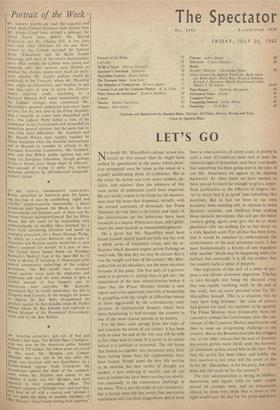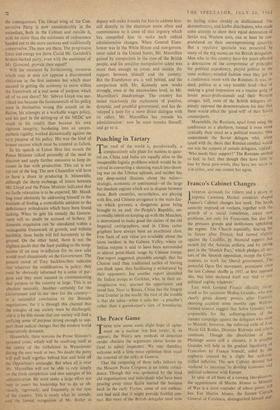LET'S GO
No doubt Mr. Macmillan's abrupt action was forced on him sooner than he might have wished by speculation in the press, which (how- ever prompted) must be taken as the token of a rapidly accelerating drain of confidence. But in the event the action was even more ruthless, de- cisive, and salutary than the admirers of this most, astute of politicians could have expected. He can hardly expect to be loved for his decisive- ness (and the haste that dispensed, initially, with the normal courtesies of dismissal); but Prime Ministers are not there to be loved, and many of the observations on his behaviour have been mawkish to a degree. Politicians must, and rightly, share the same hazards as unsuccessful generals.
On a given day Mr. Macmillan must have found himself clearly faced not with one but with a whole series of concentric crises, and the in- dicators which demand urgent action flashing on every side. On that day we may be certain that it was the weight and fate of the country Mr. Mac- millan felt on his shoulders. not the mere electoral fortunes of his party. The first duty of a govern- ment is to govern or, failing that, to get out: the constitution of the new administration makes it clear that the Prime Minister, intends a new vigour and a less equivocal assertion of leadership in grappling with the tangle of difficulties (many of them aggravated by the contradictory com- plexities of international finance) which have been threatening to half-strangle the country in one of the most crucial periods in its history.
For the basic crisis springs from the midst of and concerns the whole of our society. It has been with us since the end of the war and will be with us for some time to come. It is social in its nature before it is political or economic. The old hoops that bound us together into purposive unity have been rusting faster than the replacements have been forged. People sense the new life waiting to be entered, but new modes of thought are needed, a new ordering of society, and all our central institutions have been reacting too slowly. too cautiously, to the tremendous challenge of the times. This is not the result of any conspiracy, but it breeds none the less surely that uncreative resentment and truculent sluggishness which have
been so characteristic of recent years. A society in such a state of transition must lack at least the outward signs of dynamism; and there is no doubt that something has been going sour in the tone of our life. Sometimes we appear to be slipping backward. At other times we have seemed to
have moved forward far enough to give a super- ficial justification to the inflation of slogans like `we've never had it so good' into somethinglike doctrines. But in fact we have in our own economy been standing still, in relation to more dynamic societies, and inhibited from making -those decisive movements that will get the entire country going again—and give the lie to those pessimists who see nothing for us but decay on a truly Spanish scale. For all that has been done, and it would be senseless to underestimate the achievements of the past seventeen years. it has been fundamentally a history of one expedient after another. Much may be happening under the surface, but outwardly it is all too evident that the country lacks a sense of purpose.
One expression of this lack of a sense of pur- pose is our chronic economic stagnation. This has in turn brought into being the electoral crisis that was rapidly resolving itself, by the end of last week, into an acute personal crisis for Mr. Macmillan himself. This is a situation that he must have long foreseen: the voice of protest had grown too loud, too insistent, to be ignored. The Prime Minister must presumably have cal- culated to reshape his Government after the con- clusion of the Common Market negotiations and then to issue an invigorating challenge to the country. But as the Brussels timetable has dragged out, so for other reasons has the note of domestic discontent grown more shrill, until the necessity of immediate action stared him in the face. Now that the action has been taken, and boldly, the first qUestion is not what will the result of this be for Mr. Macmillan, or for his party. but rather what will the result be for the country?
The new administration is strong in intellect, experience, and vigour. with far more weight placed on younger men, and no concessions offered to those who think that a move 10 the right would save the day for the party and damn the consequences. The liberal wing of the Con- servative Party is now unmistakeably in the ascendant, both in the Cabinet and outside it, with no more than the minimum of reassurance handed out to the more cautious and traditionally conservative. The men are there. The progressive force and energy are there. Could Mr. Gaitskell's broken-backed party, even with the assistance of Mr. Grimond, provide their equal?
Will the measures be forthcoming, measures which may or may not appease a discontented electorate in the first instance but which must succeed in getting the economy to move within the framework of a real sense of purpose which all of us can share? Mr. Selwyn Lloyd was sac- rificed less because the fundamentals of his policy were in themselves wrong (his assault on in- flation, his attempts at a workable wages policy, and his part in the setting-up of the NEDC are much to his credit) than because his own rigorous integrity, hardening into an unsym- pathetic rigidity, worked diametrically against the very purpose of his policy. His was the kind of honest success which must be counted as failure.
In his speech at Luton Hoo last month the Prime Minister talked pointedly of the need to discover and apply further measures to keep in- comes in line with production. This cat is not yct out of the bag. The new Chancellor will have to have a share in producing it. Meanwhile, although the sharp exchange of letters between Mr. Lloyd and the Prime Minister indicated that no facile relaxation is to be expected, Mr. Maud- ling must obviously be addressing himself to the business of finding a controllable antidote to the deflationary orthodoxies which have been found lacking. When he gets his remedy the Govern- ment will no doubt be accused of bribery. If domestic expansion can be stimulated within a manageable framework of growth, and without hardship, these barbs will fall harmlessly to the ground. On the other hand, there is not the slightest doubt that the least yielding to the temp- tations of an easy re-inflation for its own sake would react disastrously on the Government. The present mood of Tory backbenchers indicates that whatever the modifications in policy, they must be obviously informed by a sense of pur- pose and they must succeed in communicating that purpose to the country at large. This is an absolute necessity. Another—certainly for the Government and in our view for the country— is a successful conclusion to the Brussels negotiations; for it is through this channel that the energies of our society must be discharged; and it is by this means that our society will find a unifying sense of purpose strong enough to sup- port those radical changes that the modern world imperatively demands.
Meanwhile, there remains the Prime Minister's personal crisis, which will be resolving itself at the centre of the turbulence in Westminster during the next week or two. No doubt the party w ill pull itself together behind him and hold off the Opposition's onslaught. But when all is over Mr. Macmillan will not be able to rely simply on the fresh complexion and new energies of his administration. He must make a large effort not only to assert his leadership but to do so ob- viously, vigorously, and frequently in the eyes of the country. This is surely what he intends; and the formal recognition of Mr. Butler as deputy will make it easier for him to address him- self directly to the electorate more often and communicate to it some of that urgency which has compelled him to make such radical administrative changes. When General Eisen- hower was in the White House and non-govern- ment ruled in the United States, Mr. Macmillan gained by comparison in the eyes of the British people, and his sensitive manipulative talent was more than enough to create and sustain the rapport between himself and the country. But the Eisenhower era is well behind, and the comparison with Mr. Kennedy now works strongly, even at the unconscious level, to Mr. Macmillan's disadvantage. The country has tasted vicariously the excitement of positive, dynamic, and youthful government, and has de- veloped a taste for a More direct dialogue with its rulers. Mr. Macmillan has remade his administration: now he must remake himself, and go to it.



































 Previous page
Previous page